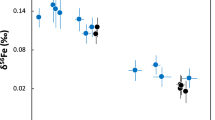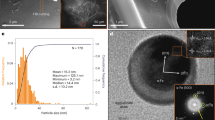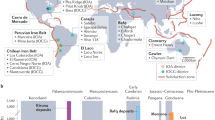Abstract
THE existence of Fe3+ in potassium feldspars is well known and it has been assumed that the iron is substituting for aluminium1. We have been investigating the geochemical characteristics of the Enchanted Rock batholith, Llano Uplift, Texas2,3, and have noted the rubidium–iron covariance reported here (see Fig. 1).
This is a preview of subscription content, access via your institution
Access options
Subscribe to this journal
Receive 51 print issues and online access
$199.00 per year
only $3.90 per issue
Buy this article
- Purchase on Springer Link
- Instant access to full article PDF
Prices may be subject to local taxes which are calculated during checkout
Similar content being viewed by others
References
Deer, W. A., Howie, R. A., and Zussman, J., Rock-forming Minerals, 4, 435 (1963).
Billings, G. K., thesis, Rice University (1963).
Ragland, P. C., thesis, Rice University (1962).
Billings, G. K., Ragland, P. C., and Adams, J. A. S., Annual Meeting Geol. Soc. Amer., Abstract (1963).
Hutchinson, R. M., Bull. Geol. Soc. Amer., 67, 736 (1956).
Billings, G. K., and Adams, J. A. S., Atomic Absorption Newsletter, 23, 1 (1964).
Rosenquist, I., Norsk. Geol. Tidds., 29, 65 (1949).
Divljan, R., Twenty-first Intern. Geol. Cong., 17, 94 (1960).
Author information
Authors and Affiliations
Rights and permissions
About this article
Cite this article
BILLINGS, G., RAGLAND, P. & ADAMS, J. Possible Rubidium–Iron Covariance in Potassium Feldspars. Nature 210, 829–830 (1966). https://doi.org/10.1038/210829a0
Issue Date:
DOI: https://doi.org/10.1038/210829a0
Comments
By submitting a comment you agree to abide by our Terms and Community Guidelines. If you find something abusive or that does not comply with our terms or guidelines please flag it as inappropriate.



